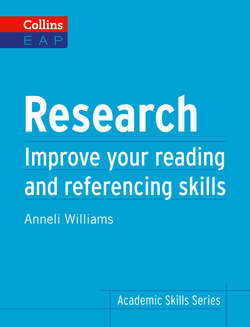Research: B2+

Реклама. ООО «ЛитРес», ИНН: 7719571260.
Оглавление
Anneli Williams. Research: B2+
Contents
Introduction
Chapter structure
Authentic academic reading texts
Glossary boxes
Using Research
Study tips
Other titles
1 Getting started
What is research?
Why do you have to do library based research?
How do you know if your research is good?
These are the questions the marker may ask themselves:
For more information on critical thinking skills, see Chapter 7
The research process
Understanding the essay question
Instruction words in essay questions
Describing versus presenting an argument
Understanding long and complex essay assignments
Writing your own essay question
Choosing a topic
Narrowing the topic down
Choosing an approach
Remember
2 Accessing information
Starting with what you already have
For more information on choosing suitably academic material, see Chapter 3. Finding information in the library
Library catalogues
Searching for books by title and author
Searching for journals by title
Searching the library catalogue by key words
Accessing e-books and e-journals
Borrowing print books and journals
Using a database
For more information on abstracts, see Chapter 4
Advanced keyword searches
Searching for phrases
Truncation
Boolean operators
Making the most of the library
Using the internet for research
For more information on choosing suitably academic material, see Chapter 3
Remember
3 Choosing the right source material
Choosing academically credible source material for your essay
Knowing who the experts are
Choosing up-to-date materials
Recognizing academic texts
Choosing relevant materials
Using abstracts to choose relevant articles
For more information on abstracts and on surveying, see Chapter 4. Managing your materials
For more examples of bibliographic entries, see Chapter 11; for more on copyright law, see Chapter 2; for more on making notes, see Chapter 8. Remember
4 Academic texts
Types of academic texts
Textbooks
Monographs
For more information on scanning, see Chapter 5
Edited books
Empirical journal articles
Source-based journal articles
Reports
Remember
5 Reading strategies
What are reading strategies and why should you use them?
Fast reading strategies
Skimming
Scanning
Intensive reading
Strategies for dealing with unfamiliar vocabulary
Strategies for dealing with unfamiliar concepts
Strategies for dealing with long and complex sentences
Remember
6 Reading more efficiently
Being an active reader
Preparing to read
Using questions to maintain concentration
Using the dictionary selectively
Guessing the meaning of vocabulary from context
Recognizing parts of words
Reading sentences in ‘chunks’
Subvocalizing
Back tracking and how to avoid it
Remember
7 Reading critically
What is critical thinking?
Facts versus opinions
Reflecting critically on your own views
Make a plan for reading
For more information on finding source texts, see Chapter 2
Identifying the arguments within reading texts
Thinking critically about the arguments within texts
For a more extensive list of questions to ask yourself when evaluating source material, see Appendix 1. Remember
8 Making notes
Knowing when, why and how to make notes
For more information on avoiding plagiarism, see Chapter 12
Noting information word-for-word
For more information on when and how to quote word-for-word, see Chapter 12
Note-making styles
Cornell method
Using tables to make notes
Using diagrams to make notes
Making concise notes
Storing and retrieving notes
Remember
9 Writing an outline
Why write an outline?
What to include in your outline?
Essay introductions
Organizing the body: Descriptive essays
Describing main features
Describing events over time
Describing a process
Comparing and contrasting information
Organizing the body: Argument essays
Writing the conclusion
Remember
10 Using sources
What are source texts used for?
When to quote and when to paraphrase
How do I quote correctly?
For more information on referencing, see Chapter 11
Paraphrasing and summarizing correctly
Remember
11 Referencing
What referencing system should I use?
For more information on plagiarism and how to avoid it, see Chapter 12
Author-date system in-text citations
Author-date style reference list
Referencing with footnotes
Writing the bibliography
Do I always need to reference?
Remember
12 Finding your voice
Using source material correctly
Why do people plagiarize?
Avoiding plagiarism
Can I use ‘I’ in my essay?
Forms of citation
Remember
13 Writing up
Getting started
Staying on topic
Using assessment criteria to redraft
For more information on assessment criteria, see Chapter 1
Keeping within your word limit
Too few words
For more information on analysis and critical evaluation, see Chapter 1
Editing the final draft
Preparing to submit your work
Remember
Reference list
Appendix 1 — Critical reading checklist
Appendix 2 — Instruction words
Appendix 3 — Prefixes, suffixes and roots
Glossary
Acknowledgements
About the Author
Answer key. Chapter 1
Chapter 2
Chapter 3
Chapter 4
Chapter 5
Chapter 6
Chapter 7
Chapter 8
Chapter 9
Chapter 10
Chapter 11
Chapter 12
Chapter 13
Отрывок из книги
Title Page
Copyright
.....
Glossary
supporting evidence Supporting evidence is information that is used to prove something.
.....